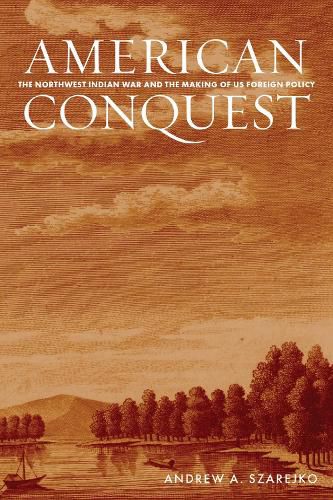Readings Newsletter
Become a Readings Member to make your shopping experience even easier.
Sign in or sign up for free!
You’re not far away from qualifying for FREE standard shipping within Australia
You’ve qualified for FREE standard shipping within Australia
The cart is loading…






The first war of America's existence as an independent state was fought against the Shawnee, the Miami, and other Ohio River Valley tribes in the Northwest Indian War of 1790-95. The war provides a window into how US conquest of the continent would proceed through the next century and comprise a central element of US foreign policy into the future. Szarejko examines why the United States first engaged in this war to secure its claim to the Old Northwest and how the reverberations of the war extend far beyond the process of settlement. In focusing on US strategy during the war-its reliance on military bases to project power and a nascent counterinsurgency doctrine-Szarejko expertly traces the patterns established by this conflict throughout American political history and demonstrates how that military victory continues to be legitimized today through local commemorations of the war. This innovative book argues forcefully against the conventional claim that early US foreign policy was isolationist, brings Indigenous politics more fully into the realm of international relations, and allows researchers in several scholarly fields to better understand the nature of American conquest.
$9.00 standard shipping within Australia
FREE standard shipping within Australia for orders over $100.00
Express & International shipping calculated at checkout
The first war of America's existence as an independent state was fought against the Shawnee, the Miami, and other Ohio River Valley tribes in the Northwest Indian War of 1790-95. The war provides a window into how US conquest of the continent would proceed through the next century and comprise a central element of US foreign policy into the future. Szarejko examines why the United States first engaged in this war to secure its claim to the Old Northwest and how the reverberations of the war extend far beyond the process of settlement. In focusing on US strategy during the war-its reliance on military bases to project power and a nascent counterinsurgency doctrine-Szarejko expertly traces the patterns established by this conflict throughout American political history and demonstrates how that military victory continues to be legitimized today through local commemorations of the war. This innovative book argues forcefully against the conventional claim that early US foreign policy was isolationist, brings Indigenous politics more fully into the realm of international relations, and allows researchers in several scholarly fields to better understand the nature of American conquest.